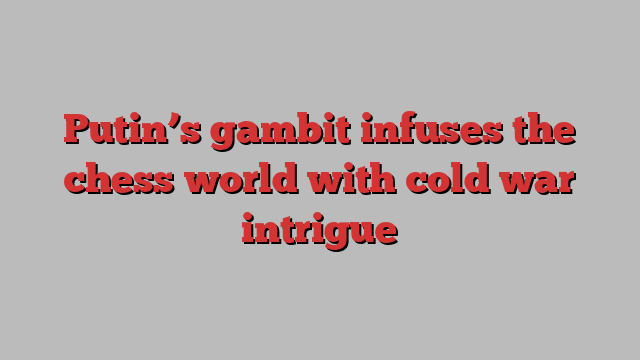
The writer is author of ‘The Billionaire Raj’
Almost from the start of Russia’s invasion of Ukraine in February 2022, world leaders have grappled with what the war’s endgame might ultimately turn out to be. Yet as it drags on in its third bloody year, the conflict has spread into a domain known for endgames of a different variety, namely the upper echelons of international chess.
Grandmasters gather this weekend in Budapest for the Chess Olympiad, a major tournament pitting teams from top chess-playing nations across the 64 squares. Russia will not be among them, however. Soon after the invasion, the International Chess Federation (Fide) banned its team, along with its flag, anthem and officials.
That decision appears to have been taken as a personal affront by President Vladimir Putin and a Russian elite long used to dominating the game’s governance and finances. Now they have launched a counteroffensive, orchestrating a vote to overturn the ban at Fide’s general assembly, which takes place alongside the Olympiad in Hungary.
Few pastimes are used more frequently as metaphors for geostrategic competition, with the world’s presidents and prime ministers described as vying for supremacy on an imagined global chessboard. But Russia’s latest gambit underlines a pattern in which chess itself often becomes a conduit for those same geopolitical currents.
The most celebrated example came at the height of the cold war in 1972, when a lengthy period of Soviet dominance was overturned by the brilliance of America’s Bobby Fischer. That match in Reykjavik quickly became a symbol of a broader struggle between capitalism and communism, helped along by the respective efforts of the CIA and KGB.
This latest battle involves similar intrigue. Russia pushed its vote surreptitiously, tabling it via allies at the Chess Federation of Kyrgyzstan. Ukraine fought back by parachuting in Oleksandr Kamyshin — an ally of President Volodymyr Zelenskyy — as the head of its chess federation. Kamyshin will be in Hungary to lobby to keep the ban, with behind-the-scenes support from western allies.
The tussle marks the latest occasion in which Russia and Ukraine have used international forums such as the UN General Assembly as extensions of their military contest. It is also an example of a larger diplomatic struggle, as western nations seek to blunt efforts by autocratic adversaries in Moscow and Beijing to control significant global institutions, from agencies such as the International Telecommunication Union to sporting bodies like the International Olympic Committee.
To understand why Russia is willing to spend valuable geopolitical capital on chess is to peer into the psyche of Putin and his entourage. Chess excellence was a mark of Soviet pride in the cold war, when the ability to churn out dazzling grandmasters appeared to reflect the ideological superiority of Marxism-Leninism. Today, viewed from Putin’s Moscow, Fide remains in effect part of the old Soviet nomenklatura system, in which pliant allies are placed at the heart of major institutions as mechanisms of Russian power and control.
That task is now complicated not just by Russia’s attack on Ukraine, but by major changes in the balance of power in global chess. The game boomed during the pandemic, as housebound players flocked to play online. Netflix’s popular drama The Queen’s Gambit helped, too. Its geographic balance is also shifting, notably in Asia. The next World Chess Championship, to be held in Singapore later this year, will pit two grandmasters from India and China, with Google as its main sponsor.
So far at least, the way chess is run has largely failed to reflect these changes. Until 2018 Fide was led by Kirsan Ilyumzhinov, a quixotic Russian oligarch best known for his claim to have been abducted by aliens. Now it is controlled by Arkady Dvorkovich, an ally of Putin and a former Russian deputy premier. “On the board the future of chess is being fought out in Asia, but its politics remain Russian-dominated and mired in the cold war,” suggests Malcolm Pein, a British international chess master who supports Ukraine’s Fide efforts.
Magnus Carlsen of Norway, the world’s best player, on Friday took the unusual step of speaking out in favour of keeping Russia banned. Yet this weekend’s battle will ultimately be decided by the votes of roughly 200 individual chess federations. Western chess bodies will vote as an anti-Russian bloc. But as in the multipolar world more broadly, the influence of the global south, in regions such as Africa and Asia, is likely to be divisive.
Either way, if chess is to thrive, it now needs to look towards an endgame of its own. The upcoming world championship in Singapore represents a chance to relaunch the game with new audiences and appropriately modern governance. But taking that opportunity means leaving behind its heritage as a pawn of Russian political influence first.